The Hard Disk Drive (HDD)
The hard drive is abbreviated to HDD, as in Hard Disk
Drive. The HDD is used as storage by your computer, think of it as a
large book shelf that you can put everything into. This allows access
to this information, without the need to insert disks, CD's, or other
items that you can store information in. Your programs, personal
information and operating system will all be here.
The
Hard Disk is often used mistakenly for the tower unit (or case).
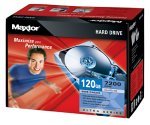
There are 4 main different types of
hard drives, SCSI,
IDE, Serial ATA, and external. We will cover these briefly.
SCSI HDD - these drives are for high end users or
servers, they are high speed, but at the same time come with a high
price bracket. They can be around 3 times the price of a standard IDE
drive, if not more. You should put series thought and research into
SCSI drives before buying.
Recommended for : Workstations, mid-level to high-end
servers, storage area networks, network attached storage, RAID storage
arrays, filing and printing, EMA/Groupware, databases, data mining,
CAD, Data Streaming, and intensive graphic applications.

IDE HDD - The IDE drive is standard in today's
computers, it attaches to the same connection as your CD and DVD
drives, because of the competitiveness of this market you should
expect to buy at a very low price. If you wish to change or add
a new HDD then you should think IDE first. Remember always buy the
largest and fastest you can afford. In present day, as long as your
computer supports it, look for at least an 80GB drive that runs at
7200 rpm, and has a 2mb cache.
Recommended for : Home users, small businesses and
most gamers
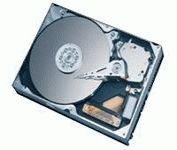
SERIAL ATA - These drives are the new competitor for
IDE. I can see in the not so distant future these drives becoming the
new standard. Most new motherboards now come with connections for the
serial ATA. These drives have large capacity, big buffers and have
fast transfer rates.
The way of the future, but best left alone until you
do a major system upgrade. Check with your motherboard manufacturer or
manual for support of these drives.
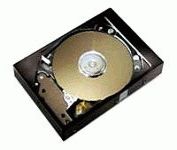
EXTERNAL HDD - Not to be used as your main drive,
these are best kept for backup and large data transfer. With the USB
2.0 drives now being the leader of the market this is the best to buy,
but remember that before buying, make sure you have USB ports on your
computer, and that these ports will support the drive. Always check
with manufacturer, as older computers will only have USB 1.1 ports.
The drive should work OK, but just make sure.
There are other types of connectors used by external
hard drives, ie PCMCIA and Firewire. Always check compatibility with
your computer before purchasing.
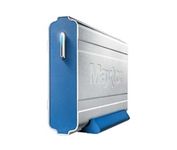
Buyers Guide
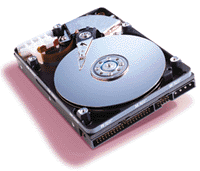
CAPACITY: Depending on what you are using your
computer for, will help determine the hard drive size.
Home user with low usage - 20 to 80GB (mostly
internet/word processing use)
Video and photo Editing user - 80GB + (Video and
photo scans are very large)
Gamer - 80GB + (due to large install sizes of games)
Remember Hard Drive prices are not consistent, the
difference between a 20GB drive and a 80GB drive is very low.
Doubling, even quadrupling size does not double price. At time of
writing a 40GB drive can be bought for £38 to £50 sterling and an
80GB drive is £53 to £71 sterling. Your own currency should show
similar change.
ROTATION SPEED: There two main speeds. 5400rpm
and 7200rpm. We will make this simple, always buy 7200rpm. Although
you may find the larger drives are mainly sold with 5400 rpm drives,
it is well worth the extra expense.
BUFFER SIZE: Most hard drives come with a
generous size, usually 2mb or above, only buy the large buffer size
(i.e. 8mb) if you are a heavy computer user.
INTERFACE SPEED: One again always buy the
fastest you can get, although this can all depend on your motherboard
and what it can support. To get maximum performance from your computer
make sure the interface speeds match. ie buy ATA/100 IDE Hard Drive
for an ATA/100 motherboard. Although the ATA/133 drive will still
work, just not at that speed.
INTERFACE TYPE: Buy IDE for IDE, don't buy SCSI
if you don't have a SCSI interface, or Serial ATA if you don't have a
motherboard that supports it. Always check with your motherboard
manufacturer, or manual for support.
SEEK SPEED: This is listed in milliseconds, so
of very little concern to you the user.

